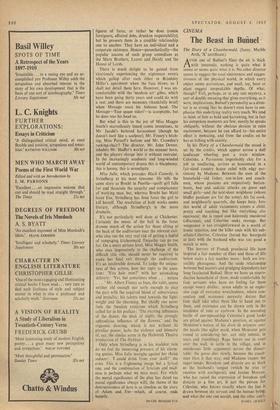CINEMA
The Beast in Buirinel
The Diary of a Chambermaid. (Jacey, Marble Arch, 'X' certificate.) AATER one of Bufinel's films the air is thick with innuendo, nothing is quite what it seems or seems quite what it is. No other director seems to suggest the total sinisterness and sugges- tiveness of the physical world, in which every object seems portentous, and snail, toy, boot or plant suggest unspeakable depths. Of what, though? Evil, perhaps, or at any rate mystery, a sort of double meaning,that gives everything. as it were, implications. Bufiuel's personality as a direc- tor is so strong that he doesn't even have to em- phasise this underlying reality very much. We tend to think of him as bold and harrowing, but in fact his outspoken moments are few; mostly he speaks obliquely, without the obvious devices to raise excitement, because he can afford to—his entire effect is menacing, and from the credits on he has us itching with anxiety.
In his Diary of a Chambermaid the mood is set by the credits, which appear across a dull landscape wheeling past a train window. Celestine, a Parisienne improbably chic for a job so unalluring, arrives as housemaid in a fair-sized country house ruled with edgy par- simony by Madame. Between the men of the household—old father, son-in-law and coach- men, whose passions are respectively button- boots, bed and sadistic attacks on geese and small girls—and the next-door neighbour (whose bluffer passions are for the army), his fat cook, and neighbourly quarrels, she keeps busy. Into this world of adult viciousness comes a child. pretty and touching but like everything else equivocal; she is raped and hideously murdered (offscreen), and Celestine seeks revenge. But vengeance is too straightforward in a world of ironic injustice, and the killer ends with his sub- stitute-Celestine, Celestine (bored bui bourgeois at last) with the husband who was too good a match to miss.
The horrors of French provincial life have inspired a fair number of films and those of life below stairs a fair number more : both are irre- sistibly photogenic. And the snide relationship between bad masters and grudging dependants has long fascinated Bufiuel. Here we have an unpro- ductive household of three, made comfortable by four servants who have no feeling for them except weary dislike : seven adults in an explo- sive cage of everyday wretchedness, where con- vention and economic necessity decree that four shall take what three like to hand out to them, and resistance can be shown only in the insolence of tone or eyebrow. In the unending battle of one-upmanship Celestine's good looks are pitted against Madame's position, or against Monsieur's notion of his droit de seigneur over the maids (the uglier maid, when Monsieur gets round to considering her, can only submit, in tears and trembling). Rage bursts out in rows over the wall, in tattle in the village, and in murderous little arguments across the dinner-. table; the goose dies slowly, because the coach- man likes it that way, and Madame counts the sugar-lumps. Boredom and distaste are as thick as the husband's tongue (which he tries to sweeten with toothpaste), and Jeanne Moreau, who has raised the expression of boredom and distaste to a fine art, is just the person for Celestine, who knows exactly where the line is drawn between the servant and the human being, and what the one can accept, and the other can't.
ISABEL QUIGLY






























 Previous page
Previous page